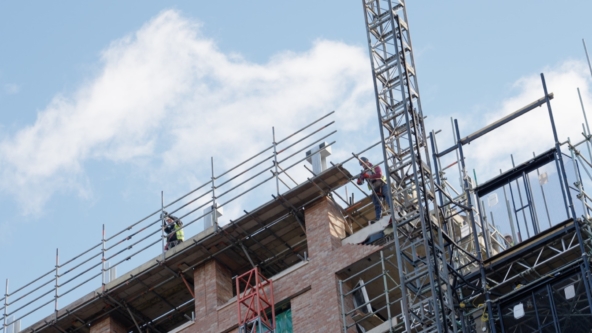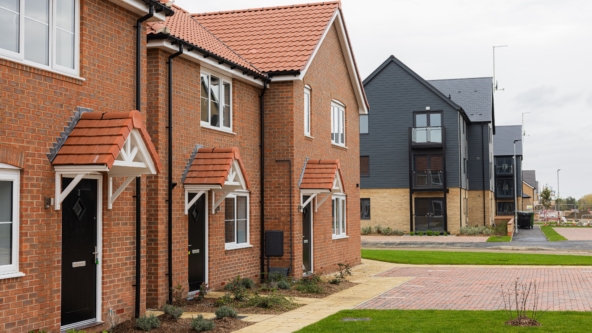The UK government’s “levelling-up” agenda aims to tackle regional inequalities. It also aims to boost living standards nationwide.
In fact, housing is referenced over 150 times in their whitepaper, standing tall as a critical piece of the puzzle.
And it’s easy to understand why.
The UK faces a stark reality: it has regional disparities and currently ranks among the most unequal developed countries. Poorer households spend a significantly higher proportion of their income on housing than wealthier households, and this gap has grown wider in recent years. In 1968, the poorest quarter of the population spent 9% of their income on housing; in 2021, it was 21%.1
The government has a crucial role to play but can’t tackle this challenge alone. To truly address this challenge, both public and private investment is needed across the UK to raise living standards and wellbeing nationwide.
The government has called explicitly on Local Government Pension Scheme (LGPS) funds to invest 5% of their assets in projects supporting the UK.
Institutional capital can deliver a meaningful impact across the UK. However, investors should approach the challenge carefully, fulfilling their fiduciary duty, obligations, as well as commitments to social and environmental change.
So, where does the potential opportunity lie to deliver impact and long-term returns?
We believe one answer is UK housing – specifically the affordable housing sector.
Why affordable housing is critical to levelling up
Housing is more than a roof over one’s head. It’s the foundation of thriving communities and vibrant economies.
High-quality housing has a clear and direct link to living standards, and within housing, the affordable housing sector presents an opportunity for an outsized social impact.
The sector seamlessly aligns with the broader levelling-up agenda:
- Economic opportunity: Affordable housing can attract and retain talent by allowing skilled workers and young professionals to move to areas with job opportunities. This fosters economic growth and innovation. When residents spend less on housing, they have more disposable income to support local businesses, further boosting the economy. Furthermore, providing housing security can help them improve their job prospects and educational attainment.
- Social wellbeing: Stable and secure housing is essential for physical and mental health, improving overall well-being and reducing social issues. Affordable housing helps anchor communities, fostering social cohesion and preventing displacement. It also leads to better educational outcomes for children, breaking the cycle of disadvantage.
- Addressing spatial inequality: Affordable housing in less prosperous areas can attract investment and businesses, reducing the dominance of major cities. Investments in affordable housing can revitalise disadvantaged areas, improving infrastructure and public services. Giving people agency through affordable homeownership or secure rentals fosters community participation and development.
- Environmental impact: By creating more energy-efficient housing, affordable housing can also have a positive environmental impact in reducing energy consumption and carbon footprint. Sustainable design and construction practices, like incorporating energy-efficient appliances, solar panels, and recycled building materials, become more accessible with affordable housing. This translates to lower energy bills for residents and a significant reduction in greenhouse gas emissions overall. Energy-efficient features in affordable housing directly address fuel poverty, a significant issue where residents struggle to afford adequate heating.
These impacts can be measured and reported, allowing investors to fulfil their obligations and commitment to investing in UK living standards.
Affordable housing also has the potential to deliver attractive returns
The potential of developing and improving the quality of affordable homes to improve living standards in the UK is matched by the potential for an attractive return profile for investors.
The affordable housing sector is built on the targeting of potential stable returns. It aims to deliver dependable cash flows and low volatility, regardless of the economic climate.
In fact, public sector funding can bolster rental incomes, ensuring a steady stream of revenue. As an added advantage, inflation-linked rents can provide a hedge against economic fluctuations, targeting growth alongside stability.
But this isn’t to say the affordable housing sector isn’t without its challenges or risks. It is a sensitive area for private investment, and investment in and management of affordable housing should consider all stakeholders via a sustainable funding model.
Our affordable housing strategy
Investing in affordable housing needs to be done in the right way to address challenges, such as ensuring collaborative and long-term models between housing associations, local authorities, and investors.
We have an affordable housing strategy that addresses the pressing need for affordable homes. Our strategy aligns closely with the social housing sector, combining the development expertise of Housing Associations and Local Authorities with our sustainability-focused goals and investors’ private capital to form a more collaborative and long-term model.
As a key part of our strategy, we acquired a Registered Provider (RP) of Social Housing called NewArch Homes in May 2022, allowing us to have a scalable “direct let” model. In it, the risk is shared fairly with Housing Association partners as they manage the properties on our behalf. As an RP ourselves, we can ensure that our strategy is appropriately regulated and provides transparency to all our stakeholders.
We are committed to being a “forever landlord” and building a portfolio of affordable homes that we and our investors can be truly proud of. We aim to fund the building of more energy-efficient homes that are affordable from the outset and throughout their use. We want to work towards a future where more people can access secure and stable homes – a sanctuary they can call their own.
To read the full report, Closing the Gap: Unlocking investment to address the UK’s affordable housing challenge, click here.
Interested in affordable housing?
Talk to one of us.
If you are interested in investing into affordable housing, or other alternative investments, we would love to hear from you. Please fill out the form below and we will be in touch shortly to arrange a time for further discussion.
1 Institute for Fiscal Studies, UK housing costs and income inequality



